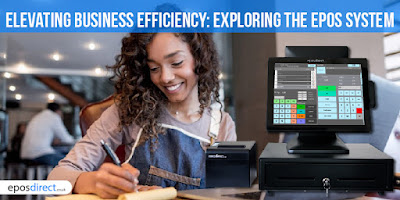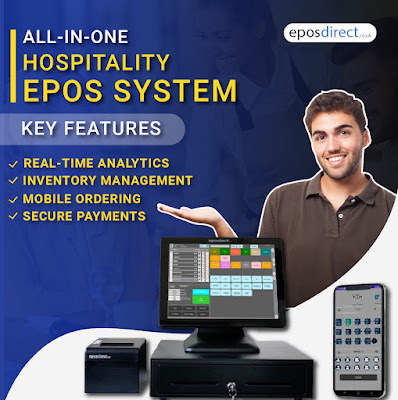In today's dynamic retail landscape, the evolution of technology
has become synonymous with progress. Among the most pivotal innovations in the
retail sphere is the Electronic Point of Sale (EPOS) system. The traditional
cash register has undergone a metamorphosis, transforming into an
all-encompassing, sophisticated system that transcends mere transaction
handling. Embracing the latest trends in EPOS retail systems
is no longer an option—it's a necessity for thriving in a competitive market.
The Evolution of Till Systems: From Cash Registers to EPOS
Gone are the days of manual cash registers and handwritten
receipts. The advent of electronic tills marked a significant shift in the
retail industry. This shop till systems automated
transactions tracked sales, and maintained rudimentary inventory records.
However, their capabilities were limited, and the need for more comprehensive
solutions emerged.
Enter EPOS systems for retail—the game-changers in modern
commerce. These systems encompass a suite of functionalities that go beyond
basic transaction processing. They integrate inventory management, customer
relationship management (CRM), sales analytics, and more into a single,
streamlined interface. The latest iterations of EPOS systems have brought forth
a wave of transformative trends reshaping the retail landscape.
Key Trends in EPOS Retail Systems
1. Cloud-Based EPOS Systems
The shift towards cloud-based EPOS systems has been monumental.
Unlike traditional on-premise solutions, cloud-based systems offer unparalleled
flexibility, scalability, and accessibility. They empower retailers to manage
multiple stores, access real-time data remotely, and swiftly implement updates
or changes across their networks.
2. Integration with Omni channel Retailing
Omni channel retailing is no longer a buzzword—it's a
fundamental strategy for success. Electronic till systems
have evolved to seamlessly integrate online and offline sales channels,
providing a unified shopping experience. This integration enables retailers to
offer click-and-collect services, facilitate returns across various channels,
and provide customers with a consistent journey regardless of where they
interact with the brand.
3. Enhanced Mobility and Flexibility
Modern EPOS systems have broken free from the confines of
traditional checkout counters. Mobility is the name of the game, with portable
devices empowering staff to assist customers anywhere in the store. Tablets and
smartphones equipped with EPOS capabilities enable quick checkouts, inventory
checks, and personalized customer interactions on the go.
4. Data-Driven Insights and Analytics
The wealth of data generated by EPOS systems is a goldmine for
retailers. Advanced analytics tools embedded within these systems provide
invaluable insights into customer behaviour, popular products, sales trends,
and more. Retailers can leverage this data to make informed decisions, optimize
inventory levels, devise targeted marketing campaigns, and enhance overall
business strategies.
5. AI and Machine Learning Integration
The incorporation of artificial intelligence (AI) and machine
learning algorithms has elevated EPOS systems to a new level. These
technologies power predictive analytics, personalized recommendations, and
dynamic pricing strategies. AI-driven till systems adapt
to changing market dynamics in real-time, optimizing pricing and promotions for
maximum profitability.
The Impact on Retail Businesses
The adoption of these latest trends in EPOS retail systems has
far-reaching implications for businesses:
1. Operational Efficiency and Cost Savings
Streamlined processes and automation significantly enhance
operational efficiency. Once time-consuming tasks, such as inventory management
or reconciling sales data, are now executed seamlessly, reducing labour costs
and human errors.
2. Improved Customer Experience
The integration of omni channel capabilities and mobility
empowers retailers to offer a personalized and convenient shopping experience.
Faster checkouts, access to product information, and tailored recommendations
contribute to heightened customer satisfaction and loyalty.
3. Informed Decision-Making
Data-driven insights derived from EPOS systems enable retailers
to make informed decisions. They can identify high-performing products,
understand consumer preferences, and adapt strategies accordingly, leading to
better stock management and marketing initiatives.
4. Future-Proofing Businesses
Staying abreast of the latest EPOS system for Retail trends
ensures that retailers remain competitive and adaptable in a rapidly evolving
market. Embracing technological advancements positions businesses to navigate
future challenges and capitalize on emerging opportunities.
Overcoming Challenges and Embracing the Future
Despite the numerous benefits, the adoption of new EPOS retail
systems comes with its challenges. The initial cost of implementation, staff
training, and data security concerns are among the hurdles businesses may face.
However, these challenges pale in comparison to the long-term advantages these
systems offer.
In conclusion, the evolution of till systems into sophisticated EPOS retail system has reshaped the retail landscape. Embracing the latest trends in EPOS technology is no longer a choice—it's a strategic imperative for businesses aiming to thrive in a competitive market. From cloud-based solutions to AI-driven insights, the opportunities these systems present are vast. By harnessing the power of these innovations, retailers can revolutionize their operations, enhance customer experiences, and secure a prosperous future in the ever-evolving retail industry.





